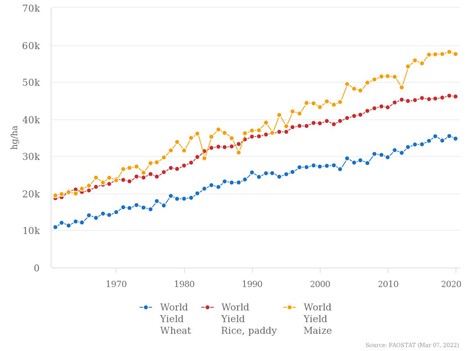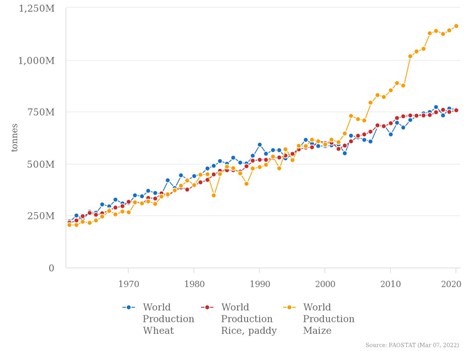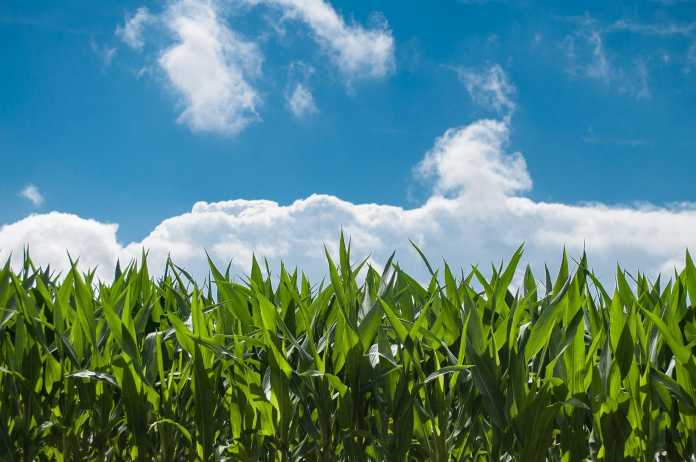In a recent Breitbart article covering part of the World Economic Forum conference at Davos, the writer points out that switching to organic farming would not solve the world’s current food crisis. This is true. Organic farming produces dramatically lower yields than modern high input farming. It also is not as environmentally friendly as climate alarmists would have people believe.
In the article, “Davos: Warnings of ‘Famines Around the World’ as Globalist WEF Talk Global Food Crisis,” journalist Peter Caddle describes how the President of the European Commission spoke about the European Union (EU) governing body’s commitment to increasing food production and “working with new tech to boost farming yields to make more food available.”
The EU’s words don’t match their actions, as described by Caddle:
However, this point seems to have been challenged by other attendees at the conference, with fears that the bloc’s hardline commitment to getting 25 per cent of all farmland to be organic as part of its green deal policies could end up stifling food production. While organic food is generally prized by wealthier consumers and seen as an essential goal by soil quality advocates, it does tend to mean lower crop yields.
Caddle’s observation is spot on.
In a Climate Realism post, here, Paul Driessen of the Committee For A Constructive Tomorrow shows that organic farming is far from environmentally friendly.
Driessen writes:
Organic farms require up to 30% more land to achieve the same yields as conventional agriculture, and most of the land needed to make that happen is now forests, wildflower fields and grasslands. Organic farmers (and consumers) also reject synthetic fertilizers, which means more land would have to be devoted to raising animals for their manure, unless human wastes are used. More lost wildlife habitat.
A report by the Alliance for Science explains that if all food production in the world was organic, it would also lead to an increase of 8-15 percent in deforestation worldwide. It goes on to explain that organic crops are grown with manure-based nitrogen fertilizer, which is “ultimately derived from artificial fertilizers used to grow crops to feed the animals on conventional farms.” If there is no more conventional farming to produce this nitrogen, shortages would occur. Without that nitrogen fertilizer, only about half of the world’s population could be fed, leading to a horrific and deadly famine.
Another study by Swedish scientists found “organic peas, farmed in Sweden, have around a 50 percent bigger climate impact than conventionally farmed peas,” and “with organic Swedish winter wheat the difference is closer to 70 percent,” as reported by EurekAlert.
Sri Lanka provides a real-world case study of the impact a government mandated shift to organic food production. In 2019, the Sri Lankan president banned the use of synthetic fertilizers and pesticides outright. An analysis conducted by Foreign Policy news found that within six months, once self-sufficient Sri Lanka needed to import rice from China as their yields dropped 20 percent. The price of rice soared 50 percent. Tea, Sri Lanka’s primary export, representing 70 percent of Sri Lanka’s export income, dropped 18 percent in only 4 months after government’s organic mandate took effect.
Poor people in developing countries farm organically not by choice, but by necessity. Lacking access to modern industrial agricultural technologies and chemicals, their survival demands it. For the wealthy in first world countries, who can afford to pay higher prices for vegetables, organic farming is virtue signaling at its worst.
With carbon dioxide fertilization, modest warming, and improvements in conventional agriculture including GMOs, pesticides and fungicides, and petroleum-derived nitrogen fertilizers, food production and yields worldwide have increased steadily. This is shown clearly in food production data from the United Nations’ Food and Agriculture Organization data as described numerous times at Climate Realism.


Europe’s decision to eschew modern agricultural technological improvement is foolish; shear environmental vanity on display. As bad an impact as the decision will have upon the economies and environments of relatively wealthy European countries, a similar program imposed on developing countries by international political elites through sanctions, tariffs, or global environmental, finance, and health policies would be a disaster for already hungry populations there. To the extent that the farming methods of old are reembraced, ills modern industrial economies had consigned to the dustbin of history will reemerge: backbreaking manual labor and more land for production will be required, all to produce lower yields, resulting food shortages, malnutrition, and widespread hunger. Breitbart serves the public well by pointing this out.

















